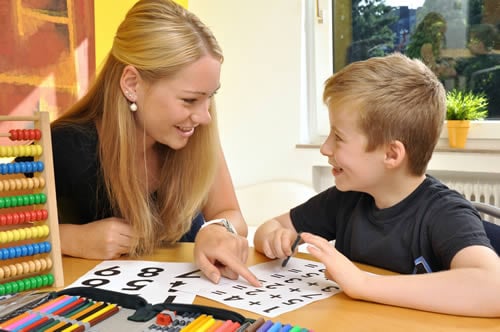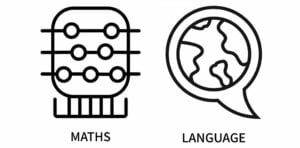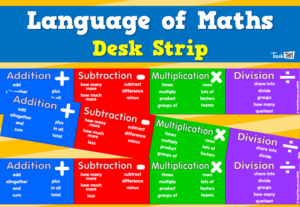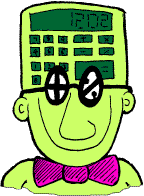For some children, out of all the subjects covered at school, Maths may cause the most anxiety. For children with special needs, who may have difficulty concentrating, remembering or understanding mathematical concepts, or trying to understand lengthy word problems, it can be doubly stressful.
But is it possible to help SEN children become more confident with numbers and acquire the numerical skills they need for adult life? If so, how do we do it?
All Children Can Improve

According to David Burghes, Professor of Maths Education at the University of Plymouth and the grandfather of a child with learning difficulties, most children – including those with SEN – can certainly make progress in Maths and even enjoy it.
One of the biggest problems for everyone with learning the subject, he says, is that Maths is ‘linear’. “That means, you can’t progress to a new topic without fully understanding the topic that came before it,” he explains. “For example, you can’t start learning about how fractions work unless you first understand what a half or a quarter is.”
“If there are any gaps in your knowledge – maybe because your teacher didn’t explain something thoroughly or even just because you had a week off school in Year 3 – it can make learning difficult further down the line.”
To help children advance, he says, teachers or tutors need to identify where these gaps have occurred and re-explain that topic – which can be easier said than done.
Mastery Learning

Professor Burghes – who is also Director of the Centre for Innovation in Mathemathics Teaching – suggests that ‘Mastery Learning’ is one way to prevent hiccups occurring in the first place. “It’s been around for more than fifty years but it’s become more popular again in recent years,” he comments. “It’s the idea that you only move on to the next topic when everyone in the class is ready.”
Another strategy that works and is especially helpful for pupils with SEN, he says, is for children who are struggling with a particular topic to have a few minutes with a teacher or assistant both before and after the main lesson. This allows them to prepare for what they are about to do and then recap afterwards and reduces a lot of anxiety in the process. A private tutor can help children with this if it isn’t possible in school.
Above all, he advises, all children should be introduced to Maths slowly, seeing how numbers are applied to everyday life, before they progress to more complex, abstract ideas.
Visit www.maths4all.org for useful resources for both parents and students.
Maths is More Challenging

Gillian, a SEN tutor and also part-qualified as an accountant, with many years’ experience teaching English, Maths and ESOL to young people with additional needs, says that Maths has become more challenging for everyone in recent years – adults and children alike.
“The government moved the goalposts and topics that used to be part of the secondary curriculum, are now taught at primary level,” she explains. “Some of the teachers might not be too confident with these areas, either.”
In addition, she says, schoolchildren are now taught new-fangled ways of solving mathematical problems which, paradoxically, can often make finding the answer more complicated.
“It’s very different to the way I was taught at school,” she continues. “Sometimes the old-fashioned ways are best. I use a lot of repetition with students, for example. The more times someone does something, the easier it becomes. We also use fingers to count and even toes! Children feel reassured with me because I tell them, ‘I’m going to show you an easy way to do it. We’re going to find ways that work for you’.”
Self-esteem

In fact, boosting self-esteem is essential when it comes to helping SEN pupils to improve their number-crunching abilities, Gillian maintains. “A lot of their issues are emotional. If they’ve struggled with Maths at school, they may have turned off and become resistant to learning. You have to give them strategies to cope and remind them of what they already know.”
“There are also times when a student is having an ‘off day’ and doesn’t want to work,” she points out. “Maybe someone’s upset them in the playground. You have to be very patient. It’s important that schools, parents and tutors all work together to support the child.”
Gillian adds that even youngsters with special needs who are very good at Maths may still require support. “Even though they find numbers easy, they may struggle with questions where the problem is described in words. You have to recognise their talent and tie maths in with things they’re interested in.”

Despite the challenges children may bring, and the negative attitudes some have about Maths, Gillian has never felt that an obstacle when teaching students. She feels she reassures children by finding out what they can or can’t do with an initial screening test or tasks and asking what they find challenging. She checks how they do their workings, reminds them of the steps, then shows better ways to get to the answers that work for them as an individual (and bearing in mind the methods the class teacher is using). “I demonstrate the help I can give in the first meeting or session and tell them, ‘I’m going to show you an easy way to do it. We’re going to find ways that work for you.’ Consequently, students take part in sessions willingly and work co-operatively; they find sessions really helpful as they see they are overcoming their obstacles in Maths at school and feel they can achieve in Maths. Their confidence and self-esteem rise quite quickly.”
Language and Literacy in Maths

Gillian adds that even youngsters with special needs who are very good at Maths may still require support. “Even though they find numbers easy, they may struggle with questions where the problem is described in words, especially if they have language or literacy needs, such as dyslexia or new to English. You have to recognise their talent and tie maths in with things they’re interested in.”
Maths Language and Vocabulary

Maths language and vocabulary can be challenging for learners. “New words often appear on topics without explanation, especially in videos, which is confusing for most children, especially the word-challenged.” In the classroom, teachers may explain new maths vocabulary but they don’t always link it to a child’s vocabulary or day-today life. “New vocabulary needs to be made clear for each topic and compared for use in day-to-day life, for example, co-ordinates on a map or graph, and to co-ordinate your clothes or colours”.
However, some students need to use their language skills to support their Maths skills, and talk themselves through the processes; whilst some find using an acronym or saying (a mnemonic) helpful to remember steps in a maths process.
Word Problems

Maths is not all about numbers. In the UK, from primary school age, children have to solve word problems in maths. This is very hard for children who have weak literacy or dyslexia. SEN Maths sessions will also focus on the literacy in maths – that is using quick ways to unpick the question, locate the information given, the task requirements, the maths operation to follow, identify the numbers that are given and the numbers that are missing, so that your child can start to work as confidently with word problems as maths calculations. A few sessions can make so much difference!
Contact the Centre for Innovation in Mathematics Teaching at www.cimt.org.
Are you are looking at developing maths skills for your child? Find a special needs tutor now >>




